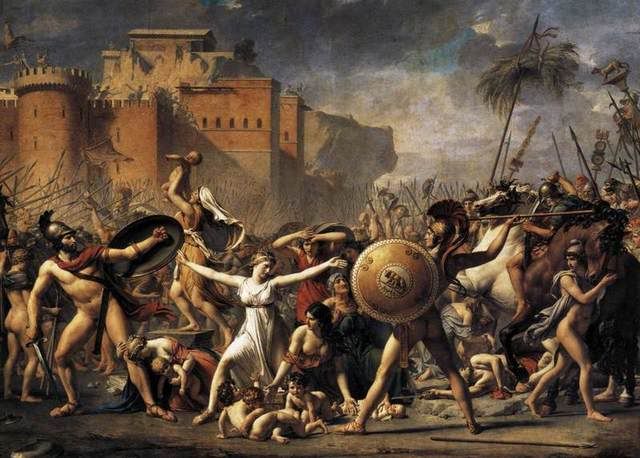why don’t you flee? They ask us -
smile.
You wrapped freedom in death, we say
in whispers no one understands.
Shabana Mir, from "Mute Freedom"

Nicolas Poussin, "The Rape of the Sabine Women" (1635)
Plutach tells us the myth of the Sabine women. Following the founding of Rome, the city increased its strength and population by granting citizenship to criminals. While this was very effective as a short-term plan, the leaders of Rome recognized that without wives with whom they could reproduce the city would not last. So they proposed to the nearby tribe, the Sabines, that the men of Rome marry their women, thereby binding the two groups together. The Sabines refused. So by means of a treacherous ruse, the Romans instead kidnapped the women in order to have them as their wives. This is the background for the many artistic portrayals of the “Rape of the Sabine Women”. The Sabine men did not stand idly by and prepared for war against Rome and eventually marched on the city. But when the two sides met for combat, the Sabine women intervened between their blood relatives and their new husbands in order to enforce a peace.
It has been suggested, more than once, that what one sees in this story is the male of fantasy of the woman falling in love with her rapist. Such fantasies are indeed common even, or perhaps, especially, today: one need only think of “Tie Me Up; Tie Me Down”. But is that really what is going on in the case of the Sabine women?
I would suggest that one need not think of the peacemaking efforts of the Sabine women as a masochistic capitulation to their rapists, or another example of neuroses, e.g., Stockholm Syndrome, but instead the recognition that the shedding of blood that was about to take place between their husbands and their brothers, no matter what the result, would not change the brutality of their situation. They would either return to being the property of their birth-families, or remain the property of their husbands; the men were fighting, not to liberate the women, but to guarantee their property rights. After all, the crime of rape perpetrated against these women was not one of sexual violence or even a violation of their will, but, in the language of the day, was really a crime against the owners and guardians of the women. The women were trade goods, vital for economic and political exchange and they had been raped, i.e., carried off without their men’s permission. Even a woman who had left voluntarily, for instance, who had eloped, would have been said to have been raped, for the crime had nothing to do with the person or the desires of women, and everything to do with the rights of her family to control her will.
And so the women made a decision to protect the one thing in which they were allowed some say and with respect to which they had some freedom: their children. David quite rightly puts the children in the center of the conflict alongside the women. Here, for the first time, the women had real intimacy beyond the community of women, a bond with men in which they were not merely economic machinery. While the biology of reproduction had been used against them to define their destiny and value, they embraced the living relations created by motherhood in order to create a space within which they were indeed allowed some love and autonomy. The intervention of the Sabine women was not, then, a pathetic refusal of liberation, but a recognition that what liberation that was available to them, limited though it was, would never be delivered by the sword of any man, and that neither their Roman husbands nor their Sabine brothers were fighting for their interests, let alone their freedom.
-LoA

Jacques-Louis David, "The Intervention of the Sabine Women" (1799)
3 comments:
my words were jagged and unworthy in the poem but you have given them meaning.
I feel heard.
you were words were very powerful in that poem. there are lines in there that are like open wounds on the page. you state so very well the dilemmas, the traps that are set out...presented to you as freedom, given to you as choices...at which point one finds that one was always already caught in the trap.
What beautiful insights, thank you.
Post a Comment